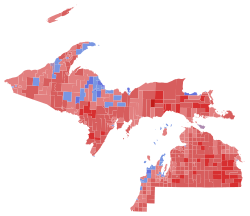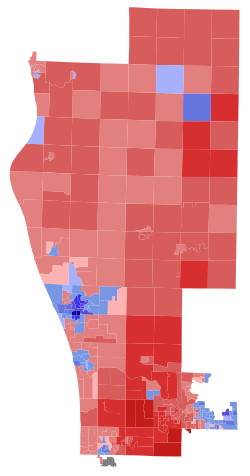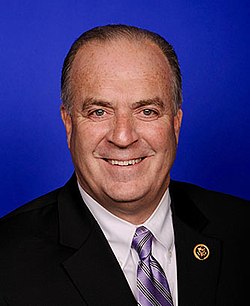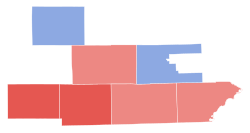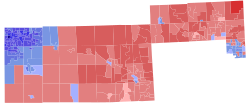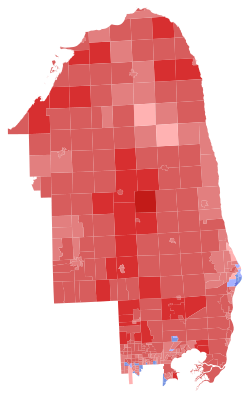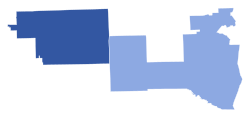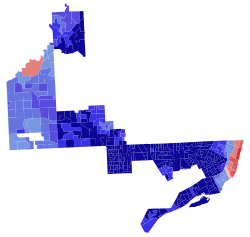2018 United States House of Representatives elections in Michigan Last updated December 20, 2025
2018 United States House of Representatives elections in Michigan Turnout 57.8% Majority party Minority party Party Democratic Republican Last election 5 9 Seats before 4 9 Seats won 7 7 Seat change Popular vote 2,165,586 1,847,480 Percentage 52.33% 44.65% Swing
District results County results Democratic
40–50%
50–60%
60–70%
70–80%
80–90%
Republican
50–60%
60–70%
70–80%
The 2018 United States House of Representatives elections in Michigan were held on November 6, 2018, to elect the 14 U.S. representatives from the state of Michigan , one from each of the state's 14 congressional districts . The elections coincided with the elections of other offices, including a gubernatorial election , other elections to the House of Representatives, elections to the United States Senate , and various state and local elections . The filing deadline for candidates filing for the August 7 primary was April 24, 2018. [ 1] Unless otherwise indicated, the Cook Political Report rated the congressional races as safe for the party of the incumbent.
Two seats shifted from Republican to Democratic control. In the 8th Congressional District , Elissa Slotkin defeated incumbent Mike Bishop and in an open seat for the 11th Congressional District , Haley Stevens defeated Lena Epstein. [ 2] This left Michigan's U.S. House delegation in the 116th United States Congress with seven Democrats and seven Republicans until July 4, 2019, when Justin Amash of the 3rd Congressional District left the Republican Party to become an independent, shifting the balance of power in Michigan's House delegation to a Democratic plurality for the first time since 2011.
Results summary Statewide Party Candi- Votes Seats No. % No. +/– % Democratic Party 14 2,165,586 52.33% 7 50.00% Republican Party 13 1,847,480 44.65% 7 50.00% Working Class Party 5 52,879 1.28% 0 0.00% U.S. Taxpayers' Party 4 27,007 0.65% 0 0.00% Independent 3 18,299 0.44% 0 0.00% Green Party 3 14,805 0.36% 0 0.00% Libertarian Party 2 12,095 0.29% 0 0.00% Total 44 4,138,151 100.00% 14 100.00%
Popular vote Democratic
52.33% Republican
44.65% Working Class Party
1.28% Other
1.74%
House seats Republican
50.00% Democratic
50.00%
District Results of the 2018 United States House of Representatives elections in Michigan by district: [ 3]
District 1 2018 Michigan's 1st congressional district election County results Precinct results Bergman: 50–60% 60–70% 70–80% 80–90%Morgan 50–60% 60–70% 70–80%Tie: 50% No votes
The 1st district consists of the entire Upper Peninsula of Michigan and the northern part of the Lower Peninsula including Alpena , Marquette , and Traverse City . This district had a PVI of R+9. The district, which makes up about 44% of the land area of the state of Michigan, is the second-largest congressional district east of the Mississippi River by land area. The incumbent was Republican Jack Bergman , who had represented the district since 2017. He was elected to replace retiring representative Dan Benishek with 55% of the vote in 2016. The Cook Political Report rated this race "likely Republican". [ 4]
Democratic primary Matt Morgan was the only Democrat to file to run. However, he was removed from the ballot because he used a PO box address on his nomination petitions instead of his residential address. Instead, Morgan ran a write-in campaign, hoping to qualify for the ballot by winning at least five percent of the total votes cast in the district for the Democratic gubernatorial primary. [ 5] Over 4,800 votes were cast in Marquette County , which would have been enough by itself to qualify Morgan for the ballot. [ 6] According to official results, Democrats cast 29,293 write-in votes in the primary for Morgan, more than seven times the 3,781-vote threshold. On August 24, the Board of State Canvassers placed him on the November ballot. [ 7]
Candidates Nominee Matthew W. Morgan, retired US Marine Corps lieutenant colonel and Iraq War veteran [ 8] Withdrawn Dwight Brady, professor [ 8] General election Endorsements Matt Morgan (D)
Labor unions
Organizations
Individuals
Polling Poll source Date(s) Sample Margin Jack Matt Undecided Change Research (D) [ 13] October 27–29, 2018 574 – 54% 42% –
District 2 2018 Michigan's 2nd congressional district election County results Precinct results Huizenga: 40–50% 50–60% 60–70% 70–80% 80–90%Davidson 40–50% 50–60% 60–70% 70–80% 80–90% >90% No votes
The 2nd district is located in West Michigan and is anchored by the suburbs of Grand Rapids such as Kentwood and Wyoming , other cities include Holland and Muskegon . This district had a PVI of R+9. The incumbent was Republican Bill Huizenga , who had represented the district since 2011. He was re-elected to a fourth term with 63% of the vote in 2016.
Democratic primary Candidates Failed to qualify Nick Schiller, political newcomer [ 8] General election Endorsements Rob Davidson (D)
Labor unions
Organizations
District 3 2018 Michigan's 3rd congressional district election County results Precinct results Amash: 40–50% 50–60% 60–70% 70–80% 80–90%Albro: 40–50% 50–60% 60–70% 70–80% 80–90% >90%Tie: 40–50% No votes
The 3rd district is located in inland West Michigan , centered on the city of Grand Rapids , and extends down to Battle Creek and Marshall . This district had a PVI of R+6. The incumbent was Republican Justin Amash , who had represented the district since 2011. He was re-elected to a fourth term with 59% of the vote in 2016.
Republican primary Candidates Nominee Justin Amash, incumbent U.S. representative [ 21] Failed to qualify Joe Farrington [ 8] Matt Hall District 4 2018 Michigan's 4th congressional district election County results Precinct results Moolenaar: 50–60% 60–70% 70–80% 80–90% >90%Hillard: 50–60% 60–70% No votes
The 4th district is located in Northern and Central Michigan including portions of the Tri-Cities region , specifically Midland , other cities include Mount Pleasant and the northern suburbs of Lansing . This district had a PVI of R+10. The incumbent was Republican John Moolenaar , who had represented the district since 2015. He was re-elected to a second term with 62% of the vote in 2016.
District 5 2018 Michigan's 5th congressional district election County results Precinct results Kildee: 40–50% 50–60% 60–70% 70–80% 80–90% >90%Wines: 40–50% 50–60% 60–70% No votes
The 5th district is located along the eastern coast of Michigan, centered on the Tri-Cities region of Mid Michigan, such as Bay City and Saginaw , and stretches down into Flint . This district had a PVI of D+5. The incumbent was Democrat Dan Kildee , who had represented the district since 2013. He was re-elected to a third term with 61% of the vote in 2016. Kildee considered running for governor in 2018, but decided to run for re-election instead. [ 25]
Republican primary Michigan's 5th district was included on the initial list of Democratic held seats being targeted by the National Republican Congressional Committee in 2018. [ 26] There was one Republican candidate, Durand resident Travis Wines, who lived outside the district. [ 8]
General election Endorsements Dan Kildee (D)
Labor unions
Organizations
District 6 2018 Michigan's 6th congressional district election County results Precinct results Upton: 40–50% 50–60% 60–70% 70–80% 80–90%Longjohn: 40–50% 50–60% 60–70% 70–80% 80–90% >90% No votes
The 6th district is located in Southwestern corner of Michigan , specifically the Michiana region. The district is anchored by Kalamazoo and the surrounding areas including Benton Harbor and Niles . This district had a PVI of R+4. The incumbent was Republican Fred Upton , who had represented the district since 1993 and previously represented the 4th district from 1987 to 1993. He was re-elected to a sixteenth term with 59% of the vote in 2016. The Cook Political Report rated this race as "likely Republican". [ 4]
Democratic primary Candidates Eliminated in primary Failed to qualify
Paul Clements, professor and nominee for this seat in 2014 and 2016 [ 32] [ 8] Eponine Garrod, local activist and quality control chemist [ 28] Endorsements George Franklin
Statewide officials
Individuals
General election Endorsements Matt Longjohn (D)
Labor unions
Organizations
Polling Hypothetical polling
Poll source Date(s) Sample Margin of Fred Democratic Other Undecided Public Policy Polling (D) [ 39] November 8–9, 2017 681 ± 3.8% 42% 41% – 17%
District 7 2018 Michigan's 7th congressional district election County results Precinct results Walberg: 50–60% 60–70% 70–80% 80–90% >90%Driskell: 50–60% 60–70% 70–80% 80–90% No votes
The 7th district is located in Southern Michigan including downtown Lansing and the western suburbs of Ann Arbor including Lodi and Milan , other cities include Adrian , Coldwater , and Jackson . This district had a PVI of R+7. The incumbent was Republican Tim Walberg , who had represented the district since 2011 and previously represented the district from 2007 to 2009. He was re-elected to a fourth consecutive and fifth total term with 55% of the vote in 2016. The Cook Political Report rated this race as "likely Republican". [ 4]
General election Endorsements Gretchen Driskell (D)
Labor unions
Organizations
Polling Poll source Date(s) Sample Margin of Gretchen Tim Undecided DCCC (D) [ 44] February 19–21, 2018 400 – 37% 41% –
District 8 2018 Michigan's 8th congressional district election County results Precinct results Slotkin: 40–50% 50–60% 60–70% 70–80% 80–90% >90%Bishop: 40–50% 50–60% 60–70% 70–80% No votes
The 8th district was centered on the state capital, Lansing , and stretches into the northern outskirts of Metro Detroit including Rochester Hills . This district had a PVI of R+4. The incumbent was Republican Mike Bishop , who had represented the district since 2015. He was re-elected to a second term with 56% of the vote in 2016. This race was considered competitive, with the Cook Political Report rating it as "Tossup" in August 2018. [ 45] [ 4] With $28 million spent, it drew the most campaign spending for a U.S. House seat in Michigan's history. [ 46] Elissa Slotkin defeated Bishop, flipping the district to the Democratic side.
Republican primary Candidates Nominee Mike Bishop, incumbent U.S. representative General election Endorsements Elissa Slotkin (D)
Labor unions
Organizations
Newspapers
Polling %support 0 10 20 30 40 50 2018/04/5 2018/09/20 2018/10/31 Bishop Slotkin Other/Undecided Opinion polling for Michigan's eighth congre...
District 9 2018 Michigan's 9th congressional district election County results Precinct results Levin: 40–50% 50–60% 60–70% 70–80% 80–90% >90%Stearns: 40–50% 50–60% 60–70% No votes
The 9th district is located in Metro Detroit including Roseville , Royal Oak , and Warren . This district had a PVI of D+4. The incumbent was Democrat Sander Levin , who had represented the district since 2013 and previously represented the 12th district from 1993 to 2013 and the 17th district from 1983 to 1993. He was re-elected to an eighteenth term with 58% of the vote in 2016. In December 2017, Levin announced his retirement, and that he would not seek re-election in 2018. [ 60]
Democratic primary Candidates Nominee Andy Levin , former director of the Michigan Department of Energy, Labor and Economic Growth and son of incumbent Sander Levin [ 61] Declined Sander Levin , incumbent representative Andy Meisner, Oakland County Treasurer [ 63] Endorsements Andy Levin
Federal officials
Current and former state officials
Polling Hypothetical polling
Poll source Date(s) Sample Margin Steve Andy Ellen Undecided GQR Research [ 67] March 17–19, 2018 400 ± 4.9% 17% — 42% 8% 33%
Primary results Democratic primary results by precinct 40–50%
50–60%
60–70%
70–80%
General election Endorsements Andy Levin (D)
Labor unions
Organizations
Newspapers
District 10 2018 Michigan's 10th congressional district election County results Precinct results Mitchell: 40–50% 50–60% 60–70% 70–80% 80–90% >90%Bizon: 40–50% 50–60% 60–70% No votes
The 10th district is located in an area of the Lower Peninsula of Michigan known as The Thumb and parts of the Metro Detroit area including Chesterfield , Macomb , and Port Huron . This was the most Republican friendly district, with a PVI of R+13. The incumbent was Republican Paul Mitchell , who had represented the district since 2017. He was elected to replace retiring representative Candice Miller with 63% of the vote in 2016.
Democratic primary Candidates Eliminated in primary Frank Accavitti Jr. Michael McCarthy District 11 2018 Michigan's 11th congressional district election County results Precinct results Stevens: 40–50% 50–60% 60–70% 70–80% 80–90%Epstein: 40–50% 50–60% 60–70% 70–80% No votes
The 11th district is located in Metro Detroit including Livonia , Novi , and Troy . This district had a PVI of R+4. The incumbent was Republican Dave Trott , who had represented the district since 2015. He was re-elected to a second term with 53% of the vote in 2016. Trott was not running for re-election in 2018. [ 68] [ 69] This race was considered to be competitive; the Cook Political Report rated this contest as a "toss up". [ 4]
Republican primary Candidates Nominee Lena Epstein, businesswoman and Michigan co-chair of the 2016 Donald Trump presidential campaign [ 70] Declined Ethan Baker, Troy city councilman and former aide to President Ronald Reagan [ 74] Mike Bouchard , Oakland County sheriff and nominee for U.S. Senate in 2006 [ 68] [ 73] Patrick Colbeck , state senator (running for governor ) [ 75] Rory Cooper, former communications director to former House Majority Leader Eric Cantor [ 80] Laura Cox , state representative [ 68] [ 73] Marty Knollenberg , state senator [ 74] (running for re-election) Mike McCready , State Representative [ 74] Ronna Romney McDaniel , chairwoman of the Republican National Committee [ 73] [ 74] Jeff Sawka, former vice chair of the Michigan Republican Party [ 74] Dave Trott , incumbent U.S. representative Endorsements Mike Kowall
Local officials
Newspapers
Polling Poll source Date(s) Sample Margin Kerry Lena Klint Mike Rocky Undecided Mitchell Research (R) [ 84] July 30, 2018 305 ± 5.7% 14% 27% 11% 10% 18% 20% EPIC-MRA [ 85] July 23–24, 2018 700 ± 3.7% 7% 26% 12% 8% 19% 28%
Democratic primary Michigan's 11th district was included on the initial list of Republican held seats being targeted by the Democratic Congressional Campaign Committee in 2018. [ 40]
Candidates Failed to qualify Daniel Haberman, businessman and attorney [ 78] Polling Poll source Date(s) Sample Margin Tim Suneel Fayrouz Nancy Haley Other Undecided EPIC-MRA [ 85] July 23–24, 2018 700 ± 3.7% 21% 14% 10% 4% 17% — 34% Target-Insyght [ 93] July 16–18, 2018 500 ± 4.5% 14% 15% 7% — 21% 4% [ 94] 39%
Libertarian party Leonard Schwartz, attorney General election Endorsements Lena Epstein (R)
Federal officials
U.S. representatives
Organizations
Newspapers
Haley Stevens (D)
Labor unions
Organizations
Newspapers
District 12 2018 Michigan's 12th congressional district election County results Precinct results Dingell: 40–50% 50–60% 60–70% 70–80% 80–90% >90%Jones: 40–50% 50–60% No votes
The 12th district is based in Ann Arbor and the surrounding cities including Ypsilanti , and the western suburbs of Detroit including Dearborn and Lincoln Park . This district had a PVI of D+14. The incumbent was Democrat Debbie Dingell , who had represented the district since 2015. She was re-elected with 64% of the vote in 2016.
District 13 2018 Michigan's 13th congressional district election Precinct resultsTlaib: 50–60% 60–70% 70–80% 80–90% >90% No votes
The 13th district is located entirely within Wayne County and is centered on the city of the Detroit and the immediate surrounding suburbs including Dearborn Heights , Garden City , and Westland . This was the most Democratic-friendly district, with a PVI of D+32. The seat was vacant for most of 2018, following the resignation of John Conyers in December 2017. [ 109] A special primary and special general election were held in August and November 2018, on dates coinciding with the already scheduled primary and general elections in a money-saving move by Michigan Governor Rick Snyder . [ 110]
Conyers represented the district from 2013 to 2017. He previously represented the 14th district from 1993 to 2013, and the 1st district from 1965 to 1993. He was Dean of the United States House of Representatives , and was re-elected to a twenty-seventh term with 77% of the vote in 2016.
Former state representative Rashida Tlaib , a member of Democratic Socialists of America , won the Democratic primary. Tlaib, however, lost the special primary to Brenda Jones , president of the Detroit City Council . Jones served for the final 35 days of the unexpired term before Tlaib was sworn in.
Democratic primary Candidates Failed to qualify Withdrew
Michael Gilmore, attorney and activist [ 8] Declined
Endorsements Brenda Jones
U.S. representatives
State legislators
Local officials
Organizations
Communications Workers of America Michigan AFL-CIO United Automobile Workers Individuals
Greg Mathis, judge and television personality Rashida Tlaib
U.S. representatives
State legislators
Organizations
Local officials
Ilona Varga, Wayne County Commissioner from District 4 Individuals
Coleman Young II
State legislators
State Rep. Ken Daniels State Rep. Fred Durhal III State Rep. Bettie Cook Scott Polling Poll source Date(s) Sample Margin Ian Shanelle Brenda Rashida Bill Coleman Undecided EPIC-MRA [ 122] July 25–26, 2018 700 ± 3.7% 7% 5% 26% 22% 20% 9% 11% Target-Insyght [ 93] July 16–18, 2018 600 ± 4.0% 8% 4% 21% 19% 20% 14% 14%
Primary results Democratic primary results by precinct 20–30%
30–40%
40–50%
50–60%
60–70%
70–80%
80–90%
>90%
20–30%
30–40%
40–50%
50–60%
>90%
20–30%
30–40%
40–50%
50–60%
60–70%
20–30%
30–40%
40–50%
>90%
Republican primary David Dudenhoefer was the only Republican candidate to announce his run for the Republican nomination, but he failed to qualify. He did, however, run as a write-in candidate. As a result, Tlaib was opposed in the general election only by minor party candidates and write-in candidates.
Candidates Failed to qualify David A. Dudenhoefer, district GOP chair [ 124] General election Endorsements Rashida Tlaib (D)
U.S. representatives
Labor unions
Organizations
Newspapers
District 14 2018 Michigan's 14th congressional district election County results Precinct results Lawrence: 50–60% 60–70% 70–80% 80–90% >90%Herschfus: 40–50% 50–60% 60–70% 70–80% No votes
The 14th district stretches from the northern Detroit suburbs including Farmington Hills , Southfield , and West Bloomfield , to eastern part of Detroit . This district had a PVI of D+30. The incumbent was Democrat Brenda Lawrence , who had represented the district since 2015. She was re-elected to a second term with 79% of the vote in 2016.
References ↑ "2018 Michigan Election Dates" (PDF) . www.michigan.gov . Archived from the original (PDF) on November 5, 2018. Retrieved March 17, 2023 . ↑ "Michigan Dems flip two Republican seats in U.S. House" . Detroit News . ↑ Johnson, Cheryl L. (February 28, 2019). "Statistics of the Congressional Election of November 6, 2018" . Clerk of the U.S. House of Representatives . Retrieved April 27, 2019 . 1 2 3 4 5 6 "2018 House Race ratings - The Cook Political Report" . The Cook Political Report . Retrieved August 29, 2018 . ↑ "Only Democrat in Michigan race will have to run as write-in candidate" . Retrieved August 29, 2018 . ↑ TRAVIS, JORDAN (August 10, 2018). "Matt Morgan declares write-in campaign a success" . Retrieved August 29, 2018 . ↑ "Democrat Matt Morgan will be on ballot in 1st Congressional District" . August 24, 2018. Retrieved August 29, 2018 . 1 2 3 4 5 6 7 8 9 "2018 Michigan Official Primary Candidate Listing - 08/07/2018" . miboecfr.nictusa.com . Retrieved August 29, 2018 . 1 2 3 4 5 6 7 8 9 10 11 12 13 14 "2018 Endorsements" . miaflcio.org . Archived from the original on September 26, 2018. Retrieved February 3, 2023 . 1 2 3 4 5 6 7 8 9 "Champions of CAMPAIGN FINANCE REFORM" . endcitizensunited.org . Archived from the original on November 8, 2018. Retrieved February 10, 2023 . ↑ Grim, Ryan (August 10, 2018). "HOW BAD ARE THINGS FOR THE GOP? A DEMOCRATIC HOUSE CANDIDATE GOT 30,000 WRITE-IN VOTES IN MICHIGAN" . ↑ Grim, Ryan. "HOW BAD ARE THINGS FOR THE GOP? A DEMOCRATIC HOUSE CANDIDATE GOT 30,000 WRITE-IN VOTES IN MICHIGAN" . 1 2 3 Change Research (D) 1 2 3 4 5 6 7 8 9 10 11 12 13 14 "2018 House Race Ratings" . Cook Political Report . Retrieved October 30, 2018 . 1 2 3 4 5 6 7 8 9 10 11 12 13 14 "2018 House Ratings" . The Rothenberg Political Report. Retrieved November 5, 2018 . 1 2 3 4 5 6 7 8 9 10 11 12 13 14 "2018 House" . Sabato's Crystal Ball . Retrieved November 5, 2018 . 1 2 3 4 5 6 7 8 9 10 11 12 13 14 "Battle for the House 2018" . RCP. Retrieved November 5, 2018 . 1 2 3 4 5 6 7 8 9 10 11 12 13 14 "Daily Kos Elections 2018 race ratings" . Daily Kos . Retrieved November 5, 2018 . [ permanent dead link ] 1 2 3 4 5 6 7 8 9 10 11 12 13 14 Silver, Nate (August 16, 2018). "2018 House Forecast" . FiveThirtyEight . Archived from the original on August 16, 2018. Retrieved November 6, 2018 . ↑ Irizarry, Jaleesa (June 4, 2017). "After health care debate, ER doctor runs against US Rep. Bill Huizenga" . WZZM . Retrieved June 5, 2017 . [ permanent dead link ] 1 2 3 4 5 6 7 8 "Who's running for Congress in Michigan" . January 7, 2018. Retrieved August 29, 2018 . ↑ Lake Research Partners (D-Davidson) 1 2 3 4 5 6 7 "CNN's 2018 Race Ratings" . CNN. Archived from the original on October 31, 2018. Retrieved July 30, 2023 . 1 2 3 4 5 6 7 "Who wins 2018? Predictions for Every House & Senate Election" . Politico . Archived from the original on November 4, 2018. Retrieved September 7, 2018 . ↑ Gray, Kathleen (May 8, 2017). "U.S. Rep. Dan Kildee will forgo race for governor" . Detroit Free Press . Retrieved May 10, 2017 . 1 2 Isenstadt, Alex (February 8, 2017). "House Republicans name Democratic targets for 2018" . Politico . Retrieved March 23, 2017 . ↑ Barrett, Malachi (July 18, 2017). "Democrat doctor challenges Fred Upton in 2018 after health care vote" . Kalamazoo Gazette . Retrieved July 18, 2017 . 1 2 Nann Burke, Melissa (May 27, 2017). "Upton generates buzz, backlash for role in health bill" . The Detroit News . Retrieved June 2, 2017 . ↑ Barrett, Malachi (July 20, 2017). "Democrat focuses on economy in 2018 challenge to Fred Upton" . Kalamazoo Gazette . Retrieved July 21, 2017 . 1 2 "Former Kellogg Exec Might Seek Upton's Seat" . WSJM . March 21, 2017. Retrieved March 23, 2017 . ↑ Devereaux, Brad (October 5, 2017). "Former Kellogg lobbyist George Franklin announces congressional run" . Kalamazoo Gazette . Retrieved October 5, 2017 . ↑ Barrett, Malachi (July 6, 2017). "Paul Clements announces third challenge to Fred Upton in 2018" . Kalamazoo Gazette . Retrieved July 6, 2017 . ↑ McNeill, John (March 7, 2017). "Kalamazoo's population grows famously" . WNWN-FM . Retrieved March 23, 2017 . 1 2 3 "George Franklin for Congress" . georgefranklin.com . Retrieved August 29, 2018 . [ permanent dead link ] 1 2 "2018 ENDORSEMENTS" . sunrisemovement.org . Archived from the original on November 25, 2018. Retrieved February 10, 2023 . ↑ DCCC (D) ↑ Public Policy Polling (D) ↑ Global Strategy Group (D-Longjohn) ↑ Public Policy Polling (D) 1 2 3 Cheney, Kyle (January 30, 2017). "Amid Democratic doldrums, DCCC identifies 2018 targets" . Politico . Retrieved March 23, 2017 . ↑ Oosting, Jonathan (July 19, 2017). "Driskell seeks rematch with Rep. Walberg" . The Detroit News . Retrieved July 19, 2017 . 1 2 3 4 "HELP OUR CANDIDATES WIN!" . emilyslist.org . Archived from the original on September 3, 2018. Retrieved January 31, 2023 . 1 2 3 "OUR CANDIDATES" . moveon.org . Archived from the original on October 19, 2018. Retrieved February 10, 2023 . ↑ DCCC (D) ↑ "Challenger Elissa Slotkin outraises Rep. Mike Bishop over three months" . Retrieved August 29, 2018 . ↑ Schuster, Simon (October 19, 2022). "Michigan's closest U.S. House races report lopsided fundraising" . mlive . Retrieved October 25, 2022 . ↑ "Races for new Circuit Court seat, state House and Senate set as filing deadline passes" . Retrieved August 29, 2018 . ↑ Spangler, Todd (July 10, 2017). "Ex-Pentagon, intelligence official Elissa Slotkin to challenge Mike Bishop for Congress" . Detroit Free Press . Retrieved July 10, 2017 . 1 2 3 4 5 6 J. KYLE KEENER (October 28, 2018). "Michigan Elections 2018: These candidates are endorsed by the Detroit Free Press" . Retrieved February 3, 2023 . ↑ Change Research (D) ↑ Brian Ellison (L) with 3%, David Lillis (T) with 0% ↑ NYT Upshot/Siena College ↑ Target Insyght ↑ Brian Ellison (L) with 2%, David Lillis (T) with 1% ↑ NYT Upshot/Siena College ↑ GQR Research (D-Slotkin) ↑ Public Opinion Strategies (R-Bishop) ↑ Public Policy Polling (D) ↑ Target Insyght ↑ Peterson, Kristina (December 2, 2017). "Rep. Sander Levin of Michigan to Retire" . The Wall Street Journal . New York. Retrieved December 2, 2017 . ↑ "Levin, Bieda running for Congress" . Retrieved August 29, 2018 . ↑ "Steve Bieda drops out of U.S. House race to run for Spranger's office" . Retrieved August 29, 2018 . ↑ Oosting, Jonathan. "Oakland County Treasurer Andy Meisner says he WON'T run for Congress in #MI9" . Twitter . ↑ "EMILY's List Endorses Ellen Lipton in Michigan's 9th District" . www.emilyslist.org . Retrieved August 29, 2018 . ↑ EPIC-MRA ↑ Lake Research Partners (D-Levin) ↑ GQR Research 1 2 3 4 Schneider, Elena (September 11, 2017). "Michigan Rep. Dave Trott won't run for reelection" . Politico . Retrieved September 11, 2017 . ↑ Roskopp, Jack. "Republican Michigan Representative Dave Trott not seeking reelection" . Archived from the original on August 1, 2018. Retrieved August 29, 2018 . 1 2 "Raczkowski, Epstein enter race to succeed Trott" . Retrieved August 29, 2018 . ↑ Jacobs, Ben (September 12, 2017). "Former congressman Kerry Bentivolio tells me he is "seriously considering" running for his old seat which is being vacated by Dave Trott" . Twitter . Retrieved September 14, 2017 . ↑ Oosting, Jonathan (October 16, 2017). "Bentivolio eyes return to Congress" . Detroit News . Retrieved October 16, 2017 . 1 2 3 4 Spangler, Todd (September 11, 2017). "U.S Rep. Dave Trott to leave Congress" . Detroit Free Press . Retrieved September 11, 2017 . 1 2 3 4 5 6 7 Nann Burke, Melissa (September 11, 2017). "Rep. Dave Trott is retiring from U.S. House" . The Detroit News . Retrieved September 11, 2017 . 1 2 Kadrich, Brad (September 12, 2017). "Heise eyes run for Trott's House seat" . Plymouth Observer . Retrieved September 14, 2017 . ↑ "Form 1 for Kurt Heise for Congress" . ↑ "Heise ends campaign for Congress, endorses Kowall" . 1 2 "Board: 7 U.S. House hopefuls tossed from primary ballot" . Retrieved August 29, 2018 . ↑ "Former candidate Kristine Bonds endorses Mike Kowall for Congress" . Mike Kowall for Congress . July 16, 2018. Archived from the original on August 17, 2018. Retrieved August 17, 2018 . ↑ Pathé, Simone (September 11, 2017). "Michigan's Dave Trott Won't Seek Re-Election in 2018" . Roll Call . Retrieved September 11, 2017 . 1 2 Lena Epstein. "Thank you to @RepDaveTrott for endorsing my campaign to represent #MI11. Congressman Trott has been a strong, conservative representative for our district throughout his time in Washington, and I look forward to bringing the same passion and conservative ideals to Congress" . Twitter . ↑ Spangler, Todd (February 22, 2018). "Patterson endorses state Sen. Mike Kowall for Trott's seat in Congress" . Detroit Free Press . ↑ "Detroit Free Press Endorses Mike Kowall in MI-11 Republican Primary" . Mike Kowall for Congress . July 27, 2018. Archived from the original on August 17, 2018. Retrieved August 17, 2018 . ↑ Mitchell Research (R) 1 2 EPIC-MRA ↑ Oosting, Jonathan (April 27, 2017). "Michigan native comes home for run against Rep. Trott" . The Detroit News . Retrieved April 27, 2017 . ↑ Todd Spangler (October 17, 2017). "State Rep. Tim Greimel joins crowded congressional field" . Detroit Free Press . Retrieved October 19, 2017 . ↑ Burke, Melissa (January 5, 2018). "Democrat Gupta raises $501K in bid to replace Trott" . The Detroit News . Retrieved March 22, 2018 . ↑ Nann Burke, Melissa (July 13, 2017). "Former Duggan official plans run against Rep. Trott" . The Detroit News . Retrieved July 13, 2017 . ↑ Kumar, Anil. "Kumar For US Congress" . Facebook . ↑ Gorchow, Zach (September 11, 2017). "On the Barb McQuade/#MI11 rumor, she says when I asked if she's looking at it, "No, not at all. I don't even live in the 11th District." . Twitter . Retrieved September 14, 2017 . ↑ "DFA backs four progressive women in primaries key to Democrats retaking U.S. House" . democracyforamerica.com . January 25, 2018. Archived from the original on August 23, 2018. Retrieved February 10, 2023 . 1 2 Target-Insyght ↑ Daniel Haberman (failed to make ballot) 4% ↑ Mike Pence. "Great to be in Michigan tonight! Proud to support @LenaEpstein - an early supporter of President Trump. She'll be a fighter for the @RealDonaldTrump agenda in Congress & a strong advocate for the people of Michigan! #MI11" . Twitter . ↑ Lena Epstein. "Thank you @realDonaldTrump for supporting our campaign to represent #MI11!" . Twitter . ↑ "Maggie's List endorsement" . Lena Epstein for Congress . Archived from the original on August 17, 2018. Retrieved August 17, 2018 . ↑ "SBA List Endorses Lena Epstein in MI-11" . Susan B. Anthony List . April 13, 2018. ↑ "Lena Epstein" . VIEW PAC . Archived from the original on August 17, 2018. Retrieved August 17, 2018 . ↑ "For Congress, from Metro Detroit" . The Detroit News . July 12, 2018. ↑ Target Insyght ↑ ALG Research (D-Stevens) Archived October 18, 2018, at the Wayback Machine ↑ Leonard Schwartz (L) with 4% ↑ Harper Polling (R-Epstein) ↑ Leonard Schwartz (L) with 1%, Cooper Nye (I) with 1% ↑ NYT Upshot/Siena College ↑ Public Policy Polling (D) ↑ Public Policy Polling (D) ↑ Gray, Kathleen; Spangler, Todd (December 5, 2017). "John Conyers retires after 53 years in office amid sexual harassment claims" . Detroit Free Press . Retrieved December 5, 2017 . ↑ "Snyder sets Aug. 7, Nov. 6 election dates to replace John Conyers in Congress" . Retrieved August 29, 2018 . ↑ Spangler, Todd (February 6, 2018). "Former Michigan state Rep. Rashida Tlaib to seek Conyers' seat in Congress" . Detroit Free Press . ↑ Bever, Lindsey (December 5, 2017). "John Conyers could be replaced by his son — who has his dad's name but not his political resume" . The Washington Post . Retrieved December 6, 2017 . ↑ Oosting, Jonathan (December 7, 2017). "Conyers III denies allegations, unsure on Congress run" . The Detroit News . Retrieved December 8, 2017 . ↑ Burke, Melissa Nann (February 5, 2018). "State lawmakers running for open seats in Congress" . The Detroit News . Retrieved March 14, 2018 . ↑ Hicks, Mark (January 26, 2018). "Detroit City Council head seeks Conyers' Congress seat" . The Detroit News . Retrieved January 29, 2018 . ↑ "Westland Mayor Bill Wild to run for John Conyers' vacated U.S. House seat" . ↑ Oosting, Jonathan (December 8, 2017). "Coleman Young II running for Congress" . The Detroit News . Retrieved December 8, 2017 . ↑ Williams, Corey; Eggert, David (December 8, 2017). "Son of late Detroit Mayor Coleman Young to run for John Conyers' seat" . The Press Democrat . Retrieved December 8, 2017 . ↑ Bartkowiak, Dave Jr. (December 5, 2017). "How Rep. John Conyers' House seat will be filled" . Click On Detroit . Retrieved December 16, 2017 . ↑ Burke, Melissa Nann (February 5, 2018). "Another state lawmaker running for Conyers' seat" . The Detroit News . Retrieved March 14, 2018 . ↑ "Kimberly Hill Knott for Congress" . www.facebook.com . Retrieved August 29, 2018 . ↑ EPIC-MRA ↑ YouTube ↑ "2018 Michigan Official Primary Candidate Listing" . Retrieved July 9, 2018 . External links Official campaign websites of first district candidates
Official campaign websites of second district candidates
Official campaign websites of third district candidates
Official campaign websites of fourth district candidates
Official campaign websites of fifth district candidates
Official campaign websites of sixth district candidates
Official campaign websites of seventh district candidates
Official campaign websites of eighth district candidates
Official campaign websites of ninth district candidates
Official campaign websites of tenth district candidates
Official campaign websites of eleventh district candidates
Official campaign websites of twelfth district candidates
Official campaign websites of thirteenth district candidates
Official campaign websites of fourteenth district candidates
U.S. U.S. (election ) Governors Attorneys State Mayors Alexandria, VA Anaheim, CA Anchorage, AK Auburn, AL Austin, TX Burlington, VT Chula Vista, CA Columbus, GA Fairfax, VA Fort Lauderdale, FL Franklin, VA Irvine, CA Lexington, KY Little Rock, AR Long Beach, CA Louisville, KY Lubbock, TX Nashville, TN (special) Newark, NJ Newport News, VA Oakland, CA Oklahoma City, OK Phoenix, AZ (special) Providence, RI Radford, VA Reno, NV San Bernardino, CA San Francisco, CA (special) San Jose, CA Santa Ana, CA Sioux Falls, SD Tallahassee, FL Virginia Beach, VA (special) Washington, DC Local Anchorage, AK Champaign County, IL Cook County, IL Cuyahoga County, OH El Paso, TX El Paso County, CO Jackson County, MO Jefferson County, MO Los Angeles County, CA Macomb County, MI Orange County, CA Orange County, FL San Diego, CA San Francisco, CA St. Charles County, MO St. Louis County, MO Washington, D.C. Wayne County, MI Statewide Ballot Alabama California Florida Michigan Ohio Utah West Virginia Related
This page is based on this
Wikipedia article Text is available under the
CC BY-SA 4.0 license; additional terms may apply.
Images, videos and audio are available under their respective licenses.






